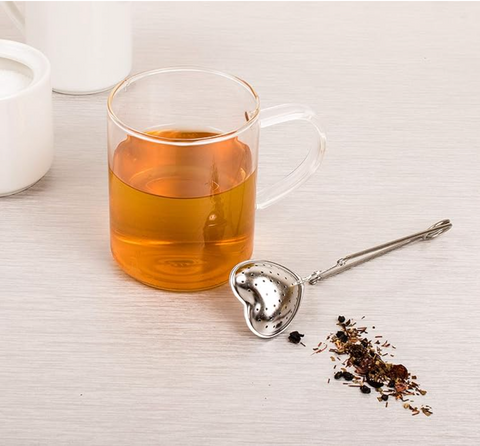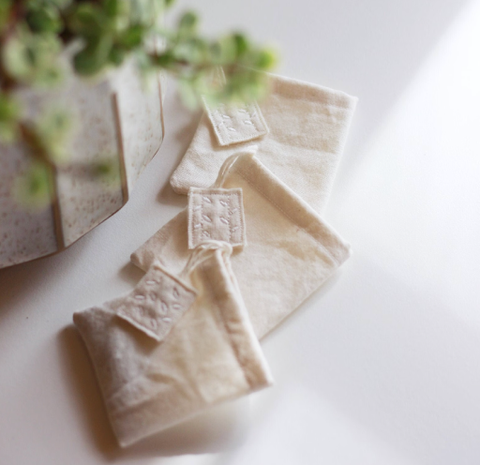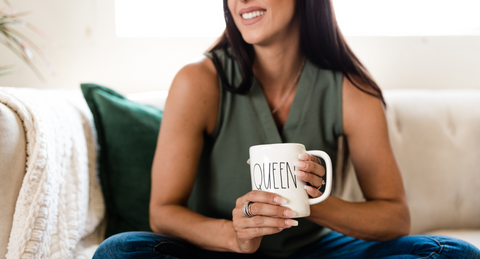Those trusted little bags of tea release microplastics into your cup with every steep. Each delicious sip could be hurting your health.
In my family, we try our hardest to live a holistic lifestyle. We eat healthy, exercise, drink plenty of water, sleep well and find joy and gratitude in our lives daily. It’s taken years, but slowly, over time, I’ve cleaned up our body products, kitchenware and eating habits. Our health has never been better!
But one thing slid under the rug, and I didn’t realize it was such a big issue. Microplastics steep into our cups with every use — and we didn’t know it! That’s why today I’m letting you in on this big news so you can avoid the dangers.
Hey there, I’m Lindsey, just in case we haven’t bumped into each other until now. I’m a mom of five rambunctious boys and a wife to the best man I know. I started this business, Elderberry Queen, with the heart to help families experience good health with natural products!
What I love most is that my business is family-run. Yup, that’s right. I take on the daily CEO role, making sure my customers are happy with the natural solutions I craft. My kids help out where they can (between school, sports and jobs), and my husband runs all the packaging and shipping.
I couldn’t do it without them. They’re the heartbeat behind every single bottle of Elderberry Syrup, Gummies, Vitamin C Tablets… well, everything in my store!
As you can see, family and health mean a lot to me — as I’m sure it does to you. So, let’s dive into microplastics in our cups of tea and what that means for us.
My Daily Cup(s) of Tea
The first thing I do every morning is shuffle out of bed, throw on my bathrobe and scooch to the kitchen to start heating water for my cup of green tea. While I’m not a HUGE coffee drinker, I do adore a good latte.
Instead, I’ve just chosen to start my day off with green tea and a heaping scoop of my favorite collagen (and the cleanest, in my opinion). It’s become part of my morning routine. After I steep my tea bag for a few minutes, I take it out, squeeze it, whisk in my collagen then curl up on the couch with my gratitude journal.
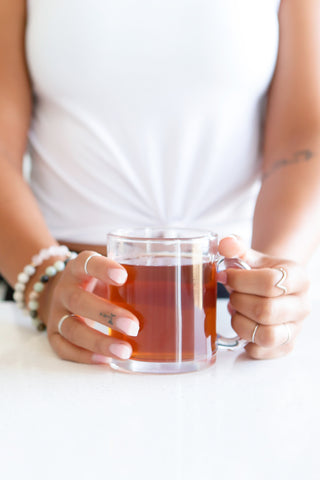
My gratitude journal is a practice I’ve started doing, and it has truly made such a difference in my life. I take time to write three things I’m grateful for first thing in the morning.
A few years ago, I was sitting all cozied up with a fluffy blanket on my lap, looking out the window and cherishing the quiet time before the craziness of life began. For some reason, I looked down at my tea bag and started wondering what the tea bag was made of.
I’ve learned that whenever something is heated, it can release harmful chemicals into your food.
That’s why we:
- Don’t use plastic Tupperware
- Cook using stainless steel and cast iron
- Don’t buy plastic plates/bowls/silverware/utensils
- Skip out on plastic wrap and foil
Because what leaches into our food matters to me! I know that heavy metals and microplastics are linked to serious health issues and have been linked to specific cancers. No, thank you!
(Learn more about non-toxic cooking here.)
But why didn’t I think about tea bags before? I was kind of kicking myself because I drink anywhere from 1-3 cups of tea a day. In the winter, it leans around 3 a day. That’s a lot of tea bags!
So, I decided to dig into some research and see what I could find.
Researchers Detect Billions of Microplastics (Tiny Pieces of Plastic) in Tea
I came across this study published in the journal Environmental Science & Technology. In this study, researchers examined four different types of teas that are packaged in plastic tea bags. They even removed the tea from the bags so that they were strictly examining the bags only. They steeped them in hot water, and what they said was crazy…
“We show that steeping a single plastic tea bag at brewing temperature releases approximately 11.6 billion microplastics and 3.1 billion nanoplastics into a single cup of the beverage.” — McGill University Researchers
Holy moly! This is insane.
There’s not enough evidence yet to show the effects on our health, but in this study, they did feed the water to a water flea. While it didn’t kill it, it did show behavioral and anatomical abnormalities.
Uh, uh. Nope. That’s enough for me!
Big Concerns When It Comes to Microplastics
Many studies still need to be conducted to pinpoint the effects of microplastics on our bodies.
But, researchers have released a few areas of concern, such as:
- Microplastics are detected in human feces.
- Plastics release estrogen-like chemicals, which can mess with your health by potentially causing cancer and hormonal imbalances. It’s a known fact that things like hot water, running them through the dishwasher, leaving them in the sun, or microwaving them can speed up this kind of chemical leakage.
- A build-up of microplastics in your body could trigger inflammation, according to preliminary research.
- Microplastics can build up in your internal organs, compromising your immune system and cell health.
- Certain microplastic particles can cross the blood-brain barrier and impact the cardiovascular system. This can mess with nutrient absorption and even reproduction.
I know, I know, it feels like everything can hurt us these days. And a lot of things can! But I would rather know. I want to be aware — for my health and my family’s health.
The good news… there are plenty of options to get your tea fix, minus the microplastics.
Options for a Healthier Cup of Tea
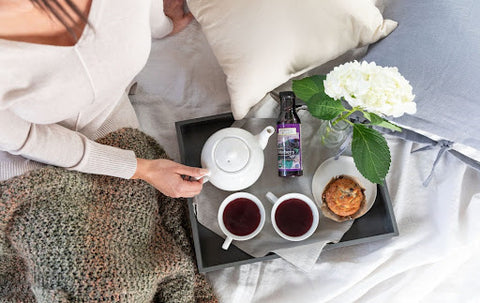
There are several options to get all that delicious tea goodness and the incredible benefits to go along with it — all while skipping out on the consuming plastic part. Thank goodness!
Here are the three healthiest options out there:
1. STAINLESS STEEP INFUSER
This will always be my top recommendation! Even if you find plastic-free tea bags, you then need to research what they’re using for their bags. Where are those ingredients being derived from? GMO corn starch?
Don’t be fooled into thinking “compostable” or “plastic-free” is the healthiest option. Is it healthier in the sense that it doesn’t have plastic? Absolutely! But you need to ask yourself what else is in there as well.
Check out my favorite stainless steel Tea Infuser here.
No wondering, no guessing, no putting your health in someone else’s hands. Real tea, real ingredients and a stainless steel infuser… it doesn’t get better than that!
2. ORGANIC COTTON TEA BAGS
This is the healthiest way to go if you’d prefer to use more of the bag method instead of an infuser. Amazon has GOTS-certified organic cotton tea bags that are adorable and work wonderfully!
Check out these tea bags here.
3. ORGANIC LOOSE LEAF TEA
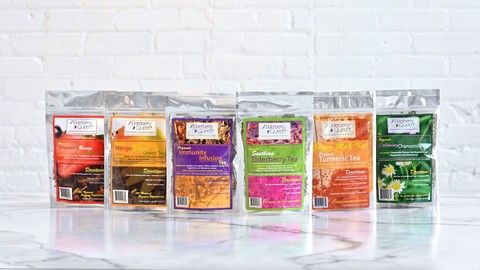
To use the two options above, you’ll need to have high-quality loose-leaf tea! Upgrade your ritual with organic loose-leaf tea that fuels your mind and body. Our delicious tea blends have been crafted specially to deliver a delightful, soothing, uplifting experience.
Here are the loose-leaf tea blends that I’ve personally put together for you:
- Immunity Infusion
- Soothing Elderberry
- Calming Chamomile
- Golden Milk
- Strawberry Breeze Green Tea
- Decaffeinated Mango Tango Green Tea
Explore all of my organic loose-leaf teas by clicking here.
Small Switch, Big Impact
Now that you understand what’s really happening as you steep that tea bag in your mug of hot water, it’s time to do something about it. Take the steps to swap them out for a tea infuser or organic tea bags along with loose-leaf tea.
After a month of making the switch, I realized I was doing more than ditching microplastics, I was saving money, too! It’s a win-win all around and an easy decision to make. Especially when it can make a big impact on your health!
Here’s to an informed and healthier you. 💜











